|
Caring for Seniors with Autism | Senior Care - Parent Giving Article from American website - www.parent giving.com  When we hear about autism spectrum disorder (ASD), we often think about small children and the challenges they will need to face throughout their lives, but most often than not we forget that these children will grow up and turn into young adults and then seniors. Although autism can’t be cured, there are many approaches that you, as a caregiver – whether you are a beloved family member or a paid professional - can make to facilitate the life of an elderly that has been diagnosed with ASD. Autism Spectrum Disorder can be diagnosed at any stage in life, however, when it is rather later than earlier, it can be a little more challenging - but not impossible - to adjust. If diagnosed at a later stage in life, usually, a series of changes in the daily routine and care needs to be made. If the diagnosis was made in the early years, this is something that you will be more accustomed to and dealing with a senior with Autism could be a little less changeling for the family. We must all agree that one of the most important aspects of our existence is having a good quality of life, and so, with that in mind, here are some great tips on how to take care of seniors with ASD. 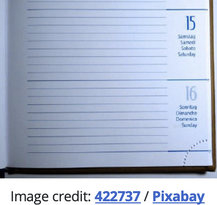 Keeping a daily routine In general, individuals with ASD need a healthy daily routine. These simple everyday tasks will be extremely powerful as they will reinforce a feeling of happiness, stability and overall well-being. When these feelings are surfaced and experienced, it will be much easier for them to accept and handle other changes when needed. A great proactive plan is to sit down and make a morning schedule or a to-do list with the ASD senior. The routine must be straightforward and easy to follow. Some examples can include healthy meal times, short walks - if possible, an art class, medication at a specific time of the day, attending a support group, quality family time. Also, keep in mind that a hygiene routine should be included. Reminding the senior with ASD of the good points of their appearance can be a good way of encouraging healthy hygiene habits. A safe environment for everyone
It is imperative to ensure that the environment is prepared according to the difficulties of each individual. For example, if the elderly person has difficulty moving around, it is essential to avoid slippery rugs, floors and cluttered spaces. Another idea is to install wall bars around so they can walk freely when needed. Sociability is a must To improve the individual's quality of life diagnosed with Autism, a key element is social interaction. Whenever possible, seniors should attend a support group. Support groups can be a great place for them to identify with other people that face the same everyday challenges. Always go slow and see how they feel - they don’t like being pushed too hard into doing something they are not 100% comfortable with and sure about. A good idea is to start nice and easy, with an easy topic and then add someone else into the conversation. Since social interaction can be harder for seniors with ASD, support groups could be added to the routine. Family support can be life-changing to ensure good self-esteem and results in individuals with autism in older stages in life, it is important to have a good, caring and healthy family environment. Although it is not always easy to deal with elderly and autistic patients, the family is one of the most important roles in this process. Be kind to their sensitivities People with autism are far more sensitive as their senses are sharper than normal. Music and general noises will sound louder in their ears, lights can appear much brighter for them and smells can feel stronger. With this in mind, try to find out which one of these senses can be a trigger and work towards minimizing it. A lower TV and radio can be more accommodating while dimming the light or using side lamps can do the trick for avoiding distractions and stress. Watch out for the non-spoken language Autism affects the way people communicate, especially seniors, so you will need to be extra sensitive when it comes to understanding what they need and figure out what is going on with them. Simple questions such as “How are you feeling?” should be avoided and replaced with more specific questions such as “Are you happy/sad today?” “Are you feeling leg cramps or stiff joints?” Specific questions are more prompted to result in clear replies. Some ASD seniors may panic one day when they realize that they have lost their hearing or can no longer see, so all eyes should be on them to understand the unspoken words of what is happening. Reference: https://www.parentgiving.com/elder-care/caring-for-seniors-with-autism/ Update from the Ministry for Disabled People Establishment Unit It’s been a busy month at the Ministry for Disabled People Establishment Unit (EU) with just a few weeks to go before the new Ministry goes live on 1 July. The EU team is working hard on ensuring that the disability support services people receive will continue without disruption, that staff are in place for day one as well as all the foundation work required to start a Ministry. Name of the new Ministry The new Ministry will have three names – an English name, a te reo Māori name, and a NZSL name. Thanks to those of you who took part in the consultation for the new Ministry's name. The consultation process has now closed and the EU will provide an update on this soon. Further engagement opportunities Keep an eye on the EU’s engagement platform and Facebook page so you can continue to have your say on a range of topics or give them your ideas on the ideas wall. The EU is also working on other formats for you to connect with them including freepost, 0800, SMS, stakeholder networks and face to face. They‘re also planning to use public spaces (such as libraries) and create informative brochures and posters to help people find out about and connect with the new Ministry. Feel free to contact the EU if you would like copies of this material. Looking to the future From 1 July under the new Chief Executive of the Ministry will:
The exact details under each of these headings will be the role of the new Ministry under the leadership of the new Chief Executive. The appointment of this vital role is being managed by the Public Service Commission and it is understood this has been going well and they will be ready to appoint someone by the time the new Ministry starts in July. The EU encourages all our important community members to give feedback on the future Ministry’s work in whatever format you find easiest. Please see below for all the ways currently available – the EU plans to have further options in the coming weeks.
Reference Disability Directorate of the Ministry of Health. Update https://www.health.govt.nz/our-work/disability-services/disability-publications/disability-directorate-newsletter Autumn is a time for tiding up and getting ready for winter. In the garden we’re cutting things back, raking up leaves and collecting fruit from the trees. Being outside in the garden has the added benefit of exposing your skin to sunlight which help you store vitamin D ready for the winter. It’s also a busy time for preserving all excess fruit and other produce by bottling, freezing or dehydrating ready to be used in the winter. It’s a good time to attend to the things that may cause you to slip and trip around your home like paths that get no winter sun, pavers which are lost or broken, replacing outside light bulbs and cutting back foliage covering your paths. Covid Covid is now well established in the community, and we are all feeling the effects of sickness and isolations. This could be complicated by normal seasonal colds and flus this winter so ensure you have good stocks of food and medicine at home. The Burden of Ageing Relatives If you are worried about an older relative’s living situation, we can help alleviate your concerns by checking how they are managing. After doing so we would either suggest residential care or improve their independence by suggesting equipment, exercise, socialising, assistance with everyday tasks and adapting their environment. For a small fee we could make a difference to the stress in your life. Since 1985 Therapy Professionals has worked with the elderly, providing:
 Services for Children who Struggle with Life and Learning Children with major disabilities are well served by Health and Education, however many other children struggle with a range of physical, thinking or sensory problems that cause challenges for learning, social interaction and behaviour. They may:
For many years Therapy Professionals has provided services for children with disabilities, at home and in schools. If you recognise a child with any of these issues a Therapy Professionals therapist may be able to help, contact us today. 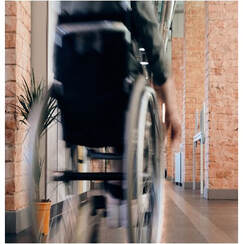 Enable Equipment – what will be funded Government funded equipment is available for people who are disabled to assist them to live as independently as possible (the exception is those in Rest Home and Hospital care). To access this equipment, you can go through your GP and get a referral to the Adult Community Therapy Team or come straight to Therapy Professionals who will be faster at doing an application for you however we have to charge for this. Repairs and Maintenance The contractors are: Mobytech Limited 0800 662 983 Email: [email protected] Wheelchair Services Plus 0508 MOBILITY (662 454) 03 366 8815 Email: [email protected] Total Equipment Care Services Limited 03 423 3574 [email protected] Rehab Enterprises 027 230 5974 [email protected]  Returning Enable equipment If you or your client no longer needs the equipment please contact Enable and ask them to collect it. First ensure the equipment is from Enable. Enable equipment has a silver label like this. If the label is different or it has no label the equipment maybe owned by the CDHB or another organisation. They have a free call number 0800 362 253 or 0800171995  Physiotherapy Assistants – Legal requirements The employer, Physiotherapy Assistant and supervising Physiotherapist need to be very clear on the limitations of the Physiotherapy Assistant role and ensure they are adhered to. Tasks specifically excluded from the Physiotherapy Assistant’s role that could put the employer and employee at risk of legal action are:
Any NZ new graduates and overseas Physiotherapists waiting for NZ registration must be considered Physiotherapy Assistants until their registration is confirmed. Physiotherapy Assistants in residential care facilities must be supervised by a NZ Registered Physiotherapist.  Having trouble finding a gift? Therapy Professionals gift vouchers could be the answer. If you want to give an elderly relative or a child with special needs a little help, and don’t know how? A gift voucher can be a very good way to do this. Choose any amount from $50 or over to go towards Physio, Speech Language, Music and Occupational Therapy and Dietetics. If you’re not sure what these therapists do, check out our website http://www.therapyprofessionals.co.nz Therapy Professionals is a community based private practice of Physio, Speech Language, Music and Occupational Therapists and Dietitians. We work with people of all ages with disabilities, our special interests being ageing, intellectual and physical disabilities.
We can help. We come to you. Phone: 03 377 5280 Email: [email protected] Website: www.therapyprofessionals.co.nz 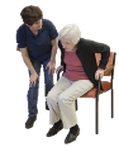 Tips on storing your fresh food to last longer We’ve all had the experience of going to our fruit bowl, pantry or fridge to find wilted, rotten, or mouldy produce which we throw out! This is a waste of good food and money. With the present inflation rate many of us can’t afford this kind of waste so here are some tips on how to make your produce last longer. The fridge and freezer - These are great inventions for improving the longevity of our perishable produce. Your fridge should be between 4-5 degrees Celsius. The temperature will vary between seasons so check the temperature occasionally. Place your fridge or freezer out of direct sunlight and heat so it doesn’t have to work so hard to keep cool and to keep an even temperature throughout the day. Cover all food in the fridge to prevent cross contamination and tainting. In your fridge store veggies in the bottom with meat, poultry and fish on the shelf above and ready to use in the top shelves. Anything that goes in the freezer should be labelled with what it is and the date frozen. Dehydrators are also a good way of preserving excess produce. Tips for fruit and veg Most fruit and veg can be kept in the fridge either in the veggie drawer or an airtight plastic container with a paper towel. The exceptions being potatoes, kumara, onions, garlic and bananas. Excess fruit and veg can be frozen either by first blanching, stewing or snap freezing, then placed in a plastic airtight container or plastic bag. Bananas - Keep your bananas away from other fruit especially if you like them greenish as the gas released by other fruit will ripen the bananas quickly. Once your bananas are ripe, they will release gas which will ripen other fruit. Freeze uneaten bananas without skins on in an airtight plastic bag or container and use for smoothies, baking or fried banana. Avocado – ripen before putting in the fridge, to speed up their ripening put them under your bananas Managing your fruit bowl – Keep only a day’s supply of fruit in your fruit bowl. As cold fruit is not as flavoursome as warm fruit, take a day’s supply out of your fridge at night so it’s at room temperature the next day ready for eating. Keep your fruit bowl out of the sun and in a coolish place.  Potatoes - store with a little soil still on, in a cool, dark, dry place, such as a pantry or cupboard. Use a storage container that is well-ventilated, such as a crate, a cardboard box with holes punched in it, or any container that will allow any excess moisture to evaporate. Onions – keep in a ventilated space, such as on your bench or pantry, in a paper bag or a wire basket.  Onions and potatoes – do not store next to each other. Onions produce a gas that makes potatoes seed quickly. They can be in the same cupboard if separated with good ventilation. Limp veggies such as lettuce, broccoli, celery and asparagus can be revived by placing the stems in a container of cold water. Pre bought packets of lettuce, salad mixes, spinach, coleslaw, open the bag and put a paper towel down each side or place in a brown paper bag. Meat – should be stored in the fridge. If it’s not going to be eaten by the use by date, store it in the freezer in an airtight well sealed plastic bag. In the fridge store meat in butchers paper tightly wrapped, in Styrofoam container it came in or an airtight container or plastic bag. If Styrofoam container is open or punctured use another method of storing. If freezing, remove from Styrofoam and put in airtight plastic bag or plastic wrap. Dairy produce - needs to be stored in the fridge and milk and cream are fine to be frozen. Cheese – once opened, if in plastic wrapping it is best kept in an airtight container with a paper towel or in a tightly wrapped beeswax cloth. For cheeses that come in paper wrappings, rewrap tightly in the paper they came in and put in an airtight container.  Eggs – will last longer if stored in the fridge, however if you want to do any baking they are best kept out of the fridge in a dark place. Bread – store in the freezer and bring out what you need. If you are going to eat the bread in the next three days and it came in a plastic bag, leave the bag open so the bread doesn’t sweat and go mouldy store in a dry, dark, cool place. Keep the crusts on the ends to help stop the middle of the loaf from drying out. These are just some tips on how to store your perishable food, so it lasts longer. Poorly stored and cared for food can be a source of food poisoning, if you need help keeping your food safe to eat Therapy Professionals Dietitians can help. Is a child you know struggling at home and school? 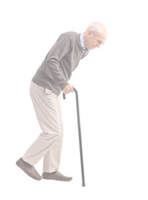 A child you know may
Physical, thinking or sensory problems may create challenges for learning, social exchanges and behaviour. Some common causes are:
Many children will not have a diagnosis; however, Therapy Professionals friendly therapists may be able to help. Some common issues families and teachers may experience are in the following lists:  Movements
Hand skills
 Sound, touch, sight, taste, smell or balance
Thinking
Relating to others
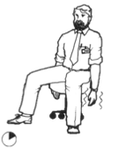 Behaviour
One or more of these problems may indicate a need for help We know when a child is struggling, it affects the whole family and classroom. Our therapists will give support and advice as required by:
Therapy Professionals Therapists
will work with people of all ages who are struggling with physical, thinking, sensory, social and behavioural challenges. We provide services wherever the person/child lives, works, learns or plays. When desirable we will work closely with:
If a child you know needs help, you don’t have to struggle alone, we can help we can come to you. Just contact Therapy Professionals: Ph: 03 377 5280 Email: [email protected] Website: www.therapyprofessionals.co.nz |
AuthorShonagh O'Hagan Archives
July 2024
|



 RSS Feed
RSS Feed